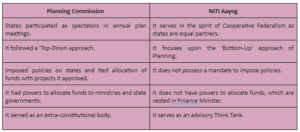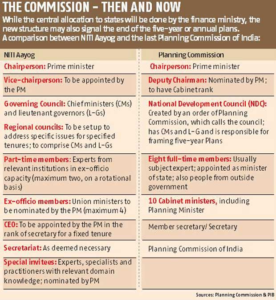In news
Recently, The Union government has granted a one-year extension to Amitabh Kant, chief executive officer (CEO) of NITI Aayog till June 2022.
About National Institution for Transforming India(NITI Aayog)
- Formation: NITI Aayog was formed via a resolution of the Union Cabinet on 1 January 2015.
- It is the premier policy think tank of the Government of India, providing directional and policy inputs.
- Apart from designing strategic and long-term policies and programmes for the Government of India, NITI Aayog also provides relevant technical advice to the Centre, States, and Union Territories.
- The Government of India constituted NITI Aayog to replace the Planning Commission, which had been instituted in 1950.
- NITI Aayog acts as the quintessential platform of the Government of India to bring the States to act together in national interest, and thereby fosters cooperative federalism.
Present Composition of NITI Aayog
- Chairperson-Shri Narendra Modi, Hon’ble Prime Minister
- Vice Chairperson-Dr. Rajiv Kumar.
- Full-Time Members
- Shri V.K. Saraswat.
- Prof. Ramesh Chand.
- Dr. V.K. Paul.
- Ex-officio Members
- Minister of Defence.
- Minister of Home Affairs.
- SMinister of Finance and Minister of Corporate Affairs.
- Minister of Agriculture and Farmers’ Welfare.
- Minister of Rural Development and Panchayati Raj.
Special Invitees
- Shri Nitin Gadkari, Minister of Road Transport and Highways and Minister of Micro, Small and Medium Enterprises
- Shri Thawar Chand Gehlot, Minister of Social Justice and Empowerment
- Shri Piyush Goyal, Minister of Railways and Minister of Commerce and Industry
- Shri Rao Inderjit Singh, Minister of State (Independent Charge) of the Ministry of Statistics and Programme Implementation and Minister of State (Independent Charge) of Ministry of Planning
Chief Executive Officer-Shri Amitabh Kant
The Governing Council of NITI Aayog
It is chaired by the Prime Minister of India and comprises Chief Ministers of all the States and Union Territories with legislatures and Lt Governors of other Union Territories. The Governing Council was reconstituted vide a notification dated 19 February 2021 by the Cabinet Secretariat.
Objectives of NITI Aayog
- To evolve a shared vision of national development priorities, sectors and strategies with the active involvement of States.
- To foster cooperative federalism through structured support initiatives and mechanisms with the States on a continuous basis, recognizing that strong States make a strong nation.
- To develop mechanisms to formulate credible plans at the village level and aggregate these progressively at higher levels of government.
- To ensure, on areas that are specifically referred to it, that the interests of national security are incorporated in economic strategy and policy.
- To pay special attention to the sections of our society that may be at risk of not benefiting adequately from economic progress.
- To design strategic and long term policy and programme frameworks and initiatives, and monitor their progress and their efficacy.
- To provide advice and encourage partnerships between key stakeholders and national and international like-minded Think tanks, as well as educational and policy research institutions.
- To create a knowledge, innovation and entrepreneurial support system through a collaborative community of national and international experts, practitioners and other partners.
- To offer a platform for resolution of inter-sectoral and inter departmental issues in order to accelerate the implementation of the development agenda.
- To maintain a state-of-the-art Resource Centre, be a repository of research on good governance and best practices in sustainable and equitable development as well as help their dissemination to stake-holders.
- To actively monitor and evaluate the implementation of programmes and initiatives, including the identification of the needed resources so as to strengthen the probability of success and scope of delivery.
- To focus on technology upgradation and capacity building for implementation of programmes and initiatives.
- To undertake other activities as may be necessary in order to further the execution of the national development agenda, and the objectives mentioned above.
Features
NITI Aayog is developing itself as a State-of-the-art Resource Centre, with the necessary resources, knowledge and skills, that will enable it to act with speed, promote research and innovation, provide strategic policy vision for the government, and deal with contingent issues.
NITI Aayog’s entire gamut of activities can be divided into four main heads:
- Design Policy & Programme Framework
- Foster Cooperative Federalism
- Monitoring & Evaluation
- Think Tank and Knowledge & Innovation Hub
The different verticals of NITI Aayog
The different verticals of NITI provide the requisite coordination and support framework for NITI to carry out its mandate.
The list of verticals include: Agriculture,Health, Women & Child Development, Governance & Research, HRD, Skill Development & Employment, Rural Development, Sustainable Development Goals, Energy, Managing Urbanization, Industry, Infrastructure, Financial Resources, Natural Resources & Environment, Science & Tech, State Coordination & Decentralized Planning (SC&DP), Social Justice & Empowerment, Land & Water Resources, Data management & Analysis, Public-Private Partnerships, Project Appraisal and Management Division (PAMD), Development Monitoring and Evaluation Office, National Institute of Labour Economics Research and Development (NILERD).
Attached/autonomous bodies
- Atal Innovation Mission.
- National Institute of Labour Economics Research and Development-Central Autonomous Organisation under the NITI Aayog, Ministry of Planning.
- The Development Monitoring and Evaluation Office -It is an attached office under NITI Aayog.
Niti Aayog Vs Planning Commision


Its initiatives
Its initiatives include “15-year road map”, “7-year vision, strategy, and action plan”, AMRUT, Digital India, Atal Innovation Mission, Medical Education Reform, agriculture reforms (Model Land Leasing Law, Reforms of the Agricultural Produce Marketing Committee Act, Agricultural Marketing and Farmer Friendly Reforms Index for ranking states), Indices Measuring States’ Performance in Health, Education and Water Management, Sub-Group of Chief Ministers on Rationalization of Centrally Sponsored Schemes, Sub-Group of Chief Ministers on Swachh Bharat Abhiyan, Sub-Group of Chief Ministers on Skill Development, Task Forces on Agriculture and up of Poverty, and Transforming India Lecture Series.
















